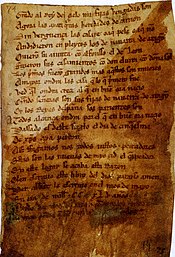Jopara
| Jopara | |
|---|---|
| Yopará | |
| Native to | Paraguay |
| Language codes | |
| ISO 639-3 | – |
| Glottolog | jopa1240 |
Jopara[1](Guarani pronunciation:[ɟopaˈɾa]) orYopará(Spanish:[ɟʝopaˈɾa]) is a colloquial form ofGuaranispoken inParaguaywhich uses a number ofSpanishloan words.Its name is from the Guarani word for "mixture".[2]
The majority of Paraguayans, particularly younger ones, speak some form of Jopara.
Social context
[edit]Speakers of both Guarani and Spanish typically employ a great deal ofcode-switchingbetween the two languages, hence why the blending of the two languages is called "Jopara," meaning "mixture." The relative amount of Guarani or Spanish used in speech varies depending upon the birth of the speakers, the place where they speak, with whom they are speaking, the topic of discussion, and how they want their meaning to be interpreted. Generally, the rural and older population tends to use more Guarani, while the urban and younger population uses more Spanish—the rural and older populationunderstandsmore Guarani and the urban and younger more Spanish. General and every-day conversation is often suited to Guarani, while technical and specific or formal conversation is often suited for Spanish.
Since 1992, under the Paraguay's Ministry of Education and Culture (MEC) Act, Guarani in its "pure form" —different from the day-to-day speech of Jopara—has been taught in schools. This led to contradictory opinions: some say that teaching pure Guarani is the best means to preserve the language's integrity, while others argue that how Guarani is taught differs greatly from how it is commonly spoken.
Lexicon
[edit]Many grammaticalmarkersfor features found in Guarani but not in Spanish, likeevidentialitymarkers, are borrowed from Guarani. For example (Guarani words in bold):[3]
- La niñandajeno comía más casi dos díasvoiy por eso estaba un poco desnutrida, pero el tuaángaigual le pegaba
- It is saidthat the girl would not eat for more than two days.Well,for that reason she was somewhat malnourished, but thestepfatherwould still hit her.
Some Spanish words, when put in a sentence mixed with Guarani, have a different meaning from that of standard Spanish. They can come fromcalquesof equivalent Guarani expressions. For example:[3]
- Tu hijo creciótodo ya.
- Your son grewall already.
In some instances, Jopara speakers simply substitute a word in either Guarani or Spanish while speaking. For example:[4]
- Moõ opyta[la/nde]baño?
- Where isthe/your bathroom?
See also
[edit]- Diglossia
- WikiProject Guaraní(in Spanish)
References
[edit]- ^Lustig, Wolf: Guaraní yjoparaen el Paraguay (http://www.staff.uni-mainz.de/lustig/guarani/art/jopara.pdf)
- ^Britton, A. Scott (2004).Guarani-English/English-Guarani Concise Dictionary.New York:Hippocrene Books.ISBN978-0781810661
- ^abEscobar, Anna María (2012). "Spanish in Contact with Amerindian Languages". In Hualde, José Ignacio; Olarrea, Anxton; O'Rourke, Erin (eds.).The Handbook of Hispanic Linguistics.Blackwell. pp. 75–77.[dead link]
- ^"Speaking Jopara: A Guide to Paraguay's Fusion of Spanish and Guarani".Explore with Finesse.January 1, 2023.RetrievedFebruary 1,2023.

